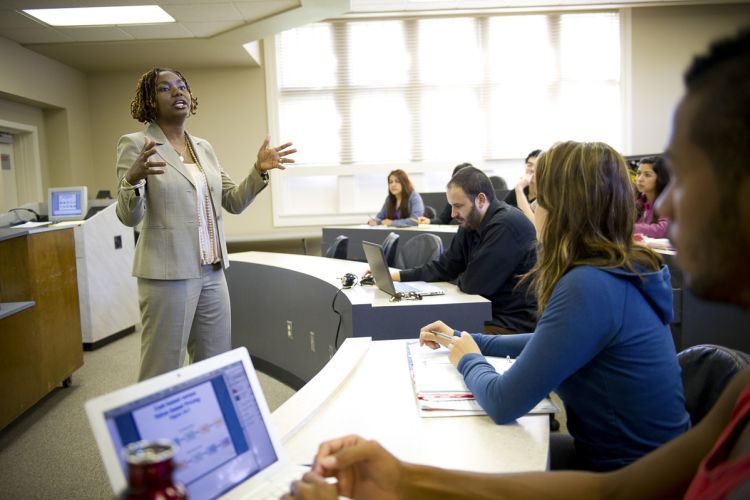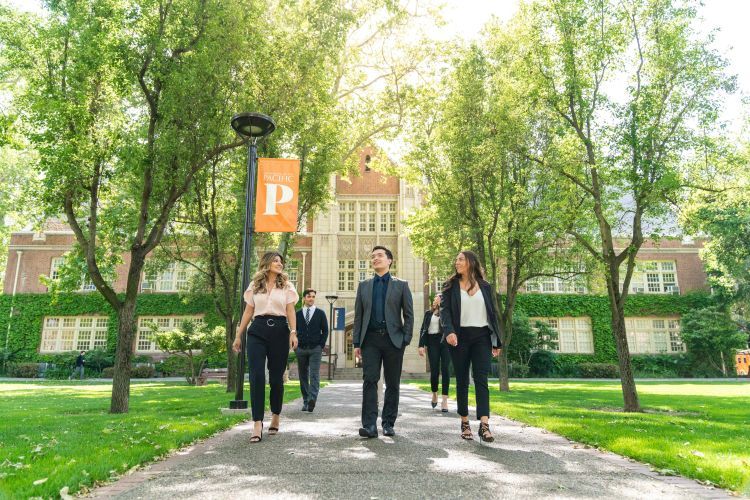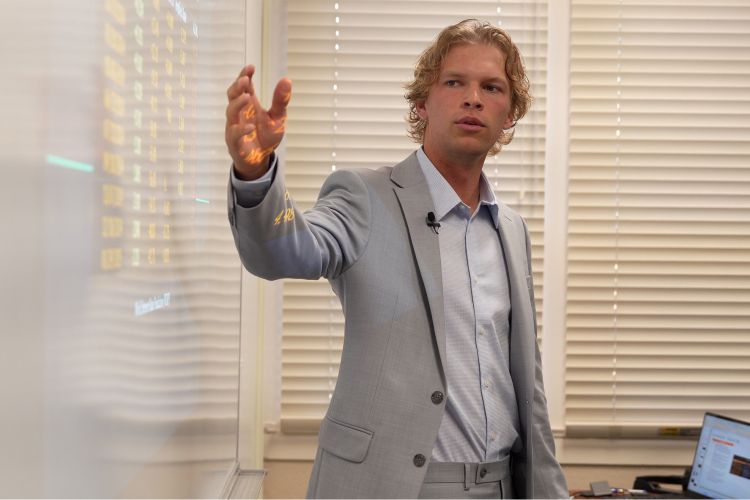Breadcrumb
Eberhardt ranks as one of the best undergrad business degrees at small universities

Eberhardt School of Business at University of the Pacific ranks as one of the nation’s best for undergraduate business degrees
The Eberhardt School of Business at University of the Pacific ranks as one of the nation’s best for undergraduate business degrees offered in a small university setting, according to a new national survey.
Poets & Quants, which covers and analyzes business education at U.S. universities, ranks the Eberhardt School No. 1 in the West – and No. 10 nationally – among business schools based at universities with 7,000 or fewer students.
“It’s an honor to be recognized among the top business schools in the country,” said Eberhardt School Dean Tim Carroll. “This ranking reflects the quality of our students and alumni, and the faculty and staff who serve them.”
Among all universities participating in the survey, Pacific’s Eberhardt School ranked No. 70 nationally.
Most of the largest and best-known business schools in the country participate in the Poets & Quants survey. This year, the Wharton School at the University of Pennsylvania was ranked No. 1 nationally, followed by the business schools at University of Virginia, New York University, University of Michigan and Georgetown University.
“While many universities offer high quality degrees, the Eberhardt School offers a top-flight undergraduate program in a much smaller, more personalized setting,” Carroll said. “Students here learn from master teachers, and they learn by doing – taking advantage of a range of experiential learning opportunities such as our innovative Student Investment Fund.”
Poets & Quants annually ranks the nation’s best business schools by looking at variables such as employment rates and compensation for new graduates, alumni satisfaction and admissions data. The other major annual analysis of undergraduate business programs, conducted by U.S. News & World Report, bases its rankings exclusively on the opinions of deans and senior faculty members at peer institutions.
“We believe that capturing data from alumni on the quality of their educational experience, along with outcomes such as job placement rates and starting salaries, provides a better measure of the quality of a college education,” Carroll said. “Since there are over 1,000 universities in the U.S. with business programs, most academics don’t have detailed knowledge about most other schools.”
The strength of the earning power of Pacific alumni was quantified by researchers at the Georgetown University Center on Education and the Workforce. An analysis of 4,500 U.S. colleges and universities found that Pacific undergraduate alumni ranked in the top 2 percent in career earnings nationally.
In California, Pacific alumni had higher career earnings than alumni from all the University of California schools as well as most of the private colleges and universities, the Georgetown study found.
Pacific President Christopher Callahan said the new national ranking “demonstrates what we at Pacific have already known – that the Eberhardt School provides a first-class business education in a setting where each student matters and where students put into practice what they learn in the classroom.”
“The Eberhardt School is a success because we have all of the right ingredients: Diverse, curious and hard-working students, passionate and inspirational faculty, an outstanding leader in Dean Carroll and extraordinary supporters led by the Eberhardts and the family-owned Bank of Stockton, who have been supporting business education at Pacific for decades,” Callahan said.
Business education started at Pacific in 1977. The program was renamed the Eberhardt School of Business in 1997 in recognition of the family’s legacy at the university. The Eberhardt family and Bank of Stockton established the Student Investment Fund, where students gain hands-on experience making investment decisions with real money. They also have endowed academic chairs, faculty research and scholarships for athletic programs and facilities.
The Eberhardts also have provided immeasurable leadership to the university. A member of the Eberhardt family has served on the University’s Board of Regents since 1953 starting with R.L. Eberhardt, followed by his son, Robert Eberhardt (’51) from 1963-1994, Mimi Eberhardt, Robert’s widow, from 1995-1998, Robert’s brother, Douglass Eberhardt (’59) from 2000-2009 and 2010-2013, and Mary-Elizabeth Eberhardt (’76, ’80), daughter of Robert and Mimi.
“We are very pleased to hear that the Eberhardt School of Business continues to be recognized for its outstanding business education,” said Douglass M. Eberhardt II, president, CEO and chairman at the Bank of Stockton. “Many of my family members, as well as many of our officers throughout the Bank of Stockton, are graduates of ESB over the years. We are very familiar with the quality of education coming from the Eberhardt School of Business. The Poets & Quants ranking results speaks to the professors and the programs there. We are proud to be a part of it.”
“It’s exciting to learn of the ESB ranking from the study, most especially since the study is unique in its objectivity, and includes alumni satisfaction, employment and compensation,” said Regent Mary-Elizabeth Eberhardt, vice president of retail banking at the Bank of Stockton. “My family has always believed in the quality of education at Pacific, and this is a very big compliment to ESB.”
Other prominent alumni from Eberhardt include Los Angeles Chargers owner Dean Spanos; Steve Goulart, executive vice president and chief investment officer at MetLife; Mary Lynn Ferguson-McHugh, CEO of Family Care and P&G Ventures at Procter & Gamble; and Seattle Seahawks head coach Pete Carroll.
The school offers specializations in accounting, business analytics, finance, management and human resources, marketing and sport management.
Read the Poets & Quants press release and see their full methodology here.





